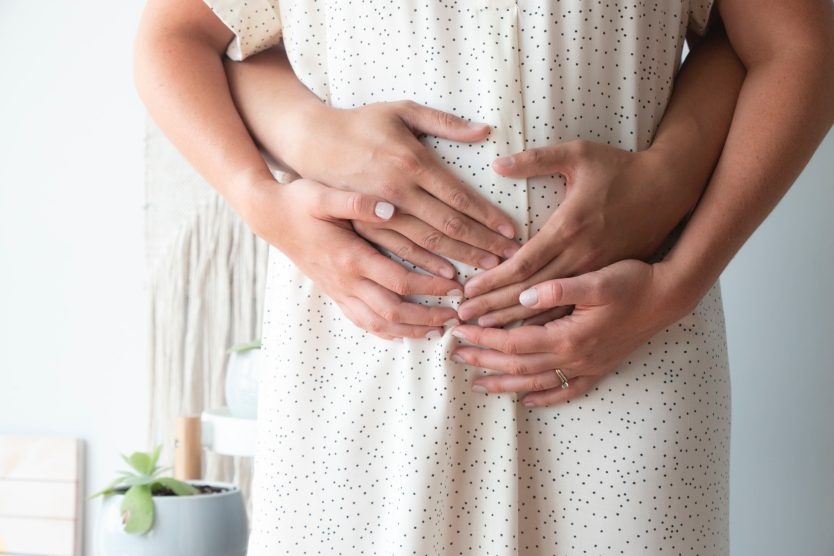If you’ve been diagnosed with endometriosis, you are familiar with the sometimes severe pain that comes along with it.
You may be suffering from other possible symptoms of endometriosis too, like fatigue, diarrhea, constipation, bloating and nausea.1
You likely also have lots of questions about your condition, with many women wondering: Can you get pregnant with endometriosis?
Let’s explore the possible answers.
Understanding Endometriosis
Endometriosis is a pelvic condition in which tissue that is similar to that found inside your uterus instead grows outside your uterus.1 Endometriosis most commonly involves the tissue lining your pelvis as well as your ovaries and fallopian tubes.1
These areas of endometrial tissue, which are sometimes called “ implants” also happen in the peritoneum, which is the membrane that lines the abdominal cavity and surrounds the internal organs; as well as the outer surfaces of the uterus, bladder, ureters, intestines, and rectum; and, sometimes in the space behind the uterus.2 Very rarely it’s found beyond the area of your pelvic organs.1
Endometriosis can be very painful. The tissue responds to changes in estrogen, and may even grow and bleed like the uterine lining does during the menstrual cycle.2 This tissue has no way to exit your body, and becomes trapped.1 The surrounding tissue can become irritated, inflamed, and swollen, and scar tissue can form.2
This scar tissue or adhesions—bands of fibrous tissue—can even cause organs to stick together.2 When endometriosis involves the ovaries, cysts called endometriomas may form. 1 It’s no wonder there is pain from the resulting bleeding, inflammation, and scarring.2
You’re Not Alone
If you’ve got endometriosis, don’t suffer in silence. It’s estimated that endometriosis occurs in about 1 in 10 women of reproductive age, and is most often diagnosed in women in their 30s and 40s.2 Worldwide estimates put the number at more than 176 million women who suffer from endometriosis and its associated symptoms.3
It can also be difficult to identify as women exhibit varying levels of symptoms depending on the location of where the condition is developing and its severity.
The most identifiable symptom is pelvic pain, typically coinciding with your period, and often getting more severe over time. Although many of us experience that painful cramping feeling during our periods, those with endometriosis typically describe the pain as far worse than usual.1
You may also experience pain during or after sex, or during bowel movements or urination. You may also experience occasional heavy menstrual periods or bleeding between periods.1
Can You Get Pregnant With Endometriosis?
There’s good and bad news with the other common symptom of endometriosis: infertility. In fact, endometriosis is sometimes first diagnosed in women seeking treatment for infertility.1
Some statistics state that almost 4 in 10 women with infertility have endometriosis. Looked at another way, it’s believed that about 30% of women with endometriosis have trouble getting pregnant.4
That’s because inflammation from endometriosis may damage the sperm or egg, or interfere with their movement through the fallopian tubes and uterus. In severe cases of endometriosis, the fallopian tubes may be blocked by adhesions or scar tissue.2
But it’s also important to remember that most women with endometriosis will become pregnant without any medical assistance. Even for women diagnosed with severe endometriosis, about 75% will be able to become pregnant, some naturally and some with the help of in-vitro fertilization.4 Doctors sometimes advise those with endometriosis not to delay having children because the condition may worsen with time.1
There’s Reason For Hope
If you have a diagnosis of endometriosis, don’t lose hope. That’s because “there is plenty of good news about endometriosis and fertility,” according to Divya Kelath Shah, a Penn Medicine physician and Associate Professor of Clinical Obstetrics and Gynecology.5
She points out:5
- “Just because you have endometriosis doesn’t mean you’re infertile.
- There’s no harm in trying to get pregnant on your own when you have endometriosis.
- There are many treatments, depending on what’s right for you.”
Your treatment will depend on the extent of the disease, your symptoms, and whether you want to have children. Various treatments include medication, particularly when pain is the main side effect of the condition. There are also options for surgery2, including laparoscopy.
Seek Diagnosis
The first step is to be evaluated by a doctor, preferably a women’s health specialist or even a fertility specialist. First, you want to be sure your symptoms are actually endometriosis, and not another pelvic health concern. Then, physicians can determine the extent of your endometriosis, and whether it may contribute to infertility. Finally, a proper treatment plan can be developed.5
Use our Physician Finder to find a doctor near you and seek treatment for your endometriosis, infertility, or other health concerns.




















